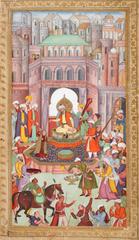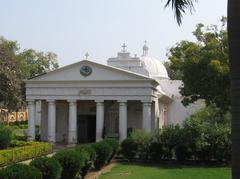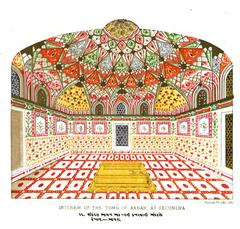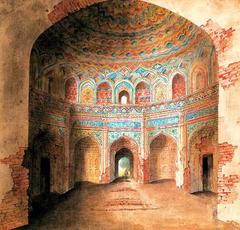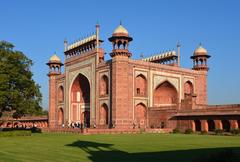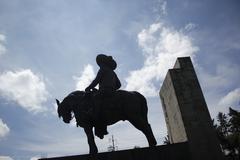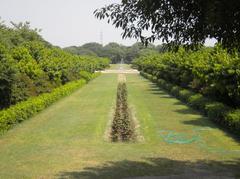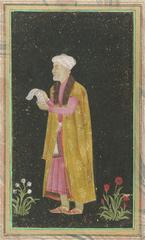Dayalbagh Educational Institute Visiting Hours, Tickets, and Agra Historical Sites Guide
Date: 04/07/2025
Introduction
Situated on the tranquil outskirts of Agra, Uttar Pradesh, the Dayalbagh Educational Institute (DEI) stands as a beacon of holistic education, spiritual heritage, and sustainable community living. Established in 1917 by followers of the Radhasoami faith, DEI has evolved into a nationally acclaimed deemed university renowned for its integration of modern science with traditional Indian values. Visitors to DEI encounter not only its lush gardens and heritage architecture but also a vibrant community deeply committed to social reform and environmental sustainability. Its proximity to Agra’s iconic attractions, such as the Taj Mahal and Agra Fort, further enhances its appeal for cultural travelers seeking a deeper understanding of the region (DEI Official Website, Tour My India).
Table of Contents
- About Dayalbagh Educational Institute
- Historical and Cultural Significance
- Visitor Information
- Campus Highlights and Layout
- Community Life and Social Structure
- Academic and Extracurricular Life
- Sustainability and Environmental Initiatives
- Daily Life and Cultural Practices
- Visitor Etiquette and Experience
- Student and Staff Engagement
- Safety, Security, and Accessibility
- Special Events and Guided Tours
- Nearby Attractions
- Frequently Asked Questions (FAQ)
- Plan Your Visit
- Conclusion
- References
About Dayalbagh Educational Institute
DEI was founded as part of the Dayalbagh colony by Radhasoami Satsang followers, with the aim of creating a self-sufficient, disciplined, and ethically driven community. Over the years, DEI has transformed from a pioneering co-educational school into a comprehensive university, with a reputation for academic rigor and a holistic approach to personal development that merges education, service, and spirituality.
Historical and Cultural Significance
Social Reform and Community Living
Rooted in early 20th-century social reform, Dayalbagh was conceptualized as a haven for truthfulness, humility, duty, and self-sacrifice. The community model in Dayalbagh eliminates caste distinctions and emphasizes universal literacy, with collective ownership of land and resources (UNESCO Chair CBRSR). The ethos of service and cooperation is visible in every aspect of campus and community life.
Educational Philosophy and Spiritual Integration
DEI’s curriculum is distinctive for its incorporation of the Radhasoami faith’s Sant Mat teachings, which stress intellectual, moral, and spiritual development. Education at DEI is value-driven and interdisciplinary, blending science and engineering with the study of culture and religion. The campus’s ashram-like environment, adjacent to the Yamuna River, fosters ideals of sustainability and self-reliance.
Visitor Information
Visiting Hours and Tickets
- DEI Campus: Open to visitors from 6:00 AM to 6:30 PM daily (confirm on the official website or via the visitor center for special events).
- Entry Fee: Free for general visitors; some events or guided tours may require prior registration or a nominal fee (Tour My India).
Accessibility and Facilities
- Wheelchair Access: The campus is wheelchair-friendly, with ramps and accessible pathways.
- Visitor Amenities: Guided tours (on request), ample parking, cafeterias, medical assistance, and Wi-Fi in public areas.
- Photography: Allowed in most areas, though restricted in spiritual or academic zones—seek permission as needed.
How to Reach DEI
- By Air: Agra Airport (approx. 12 km)
- By Train: Agra Cantt Railway Station (approx. 10 km)
- By Road: Taxis, auto-rickshaws, and private vehicles are readily available. Public transport requires some walking.
Campus Highlights and Layout
Set amidst 4.5 square kilometers of reclaimed land, the DEI campus is an oasis of greenery and tranquility (DEI Official). Its landscape features tree-lined avenues, academic buildings, residential hostels, and open green spaces. The campus’s careful planning and ongoing afforestation efforts create a serene environment conducive to study and reflection.
Community Life and Social Structure
Dayalbagh’s social organization is based on collective responsibility and mutual support. Land and property are communally owned, and daily chores are shared among residents. Social equality and service are foundational, with the community extending its welfare and educational programs to surrounding areas (UNESCO Chair CBRSR).
Academic and Extracurricular Life
DEI offers over 100 programs across disciplines including engineering, science, arts, commerce, and education (Propelld). The academic experience is enriched by mandatory work experience, community service, and a vibrant calendar of cultural, spiritual, and sports events.
Sustainability and Environmental Initiatives
Environmental stewardship is central to life at DEI. The campus features organic farming, extensive tree plantation, efficient waste management, and efforts to minimize plastic usage. The institute’s 1200-acre farm supports campus and community needs, and the overall carbon footprint is kept remarkably low (UNESCO Chair CBRSR).
Daily Life and Cultural Practices
Residents follow a lifestyle rooted in simplicity, discipline, and inclusivity. Regular spiritual gatherings (satsangs), cultural festivals, and community events foster cohesion and shared identity. Events such as Basant Day and community service drives are cornerstones of campus culture (DEI Official).
Visitor Etiquette and Experience
- Dress Code: Modest attire is expected.
- Conduct: Maintain silence in spiritual areas and respect community norms.
- Guided Tours: Recommended for deeper insights into the institute’s unique model.
- Photography: Permitted in most outdoor areas; restricted inside certain buildings and during events.
Student and Staff Engagement
Students at DEI are actively involved in academic and community projects. Faculty members often reside on campus, enhancing mentorship and collaboration (DEI Official).
Safety, Security, and Accessibility
DEI is known for its orderly and safe environment, with security managed by the community. Facilities for differently-abled visitors are available, though it is advisable to contact the institute in advance for specific needs.
Special Events and Guided Tours
Visitors can participate in cultural festivals, academic conferences, and spiritual gatherings throughout the year. Guided tours are occasionally available and should be booked in advance through the visitor center or official website.
Nearby Attractions
When visiting DEI, consider exploring Agra’s celebrated heritage sites:
- Taj Mahal (approx. 15 km)
- Agra Fort (approx. 12 km)
- Itmad-ud-Daulah’s Tomb (approx. 14 km)
- Fatehpur Sikri (short drive from Agra)
These can be combined with your DEI visit for a comprehensive Agra experience (Tour My India).
Frequently Asked Questions (FAQ)
Q: What are the visiting hours of Dayalbagh Educational Institute?
A: 6:00 AM to 6:30 PM daily.
Q: Is there an entry fee?
A: General entry is free; special tours or events may require registration or a nominal fee.
Q: Are guided tours available?
A: Occasionally, with advance booking recommended.
Q: Can I take photographs on campus?
A: Yes, in most outdoor areas—restrictions apply in some zones.
Q: How do I reach DEI from Agra city center?
A: By taxi, auto-rickshaw, or private vehicle; about 10 km from the city center.
Q: Are there facilities for differently-abled visitors?
A: Yes, but specific needs should be discussed with the institute in advance.
Plan Your Visit
- Check Updates: Visit the DEI official website for the latest information on visiting hours, events, and tours.
- Audiala App: Download the Audiala app for guided audio tours of Dayalbagh and other Agra attractions.
- Stay Connected: Follow DEI on social media for news, tips, and event updates.
Conclusion
Dayalbagh Educational Institute offers an enriching experience where education, spirituality, and sustainable living converge. Its inclusive community, verdant campus, and unique traditions make it a standout destination among Agra’s historical sites. Whether you are a student, tourist, or spiritual seeker, a visit to DEI promises insight, inspiration, and tranquility.
References and Further Reading
- Visiting Dayalbagh Educational Institute in Agra: Hours, Tickets, and Historical Insights, 2025, DEI Official Website (https://www.dei.ac.in)
- Visiting Dayalbagh Educational Institute: Hours, Tickets, Campus Life, and Visitor Guide in Agra, 2025, Tour My India (https://www.tourmyindia.com/states/uttarpradesh/dayal-bagh-agra.html)
- Story of Dayalbagh Educational Institute – UNESCO Chair CBRSR (https://www.unescochair-cbrsr.org/pdf/presentation/Story_of_Dayalbagh_Educational_Institute_Anand_Mohan.pdf)
- Propelld College Profile (https://propelld.com/site/college/dayalbagh-educational-institute)
- Vizrt Case Study (https://www.vizrt.com/community/case-studies/live-production/dayalbagh-educational-institute/)
Suggested Visuals:
- Panoramic images of Dayalbagh campus gardens
- Photos of heritage buildings and community activities
- Map showing DEI’s location relative to Agra city and major tourist sites
Tip: Including high-quality images and maps with descriptive alt tags will further enhance your online experience.
